The Role of Ethics and Moral Principles in Creating Life
VerifiedAdded on 2023/06/12
|9
|1860
|195
Essay
AI Summary
This essay delves into the intricate relationship between ethics and the creation of life, examining how moral principles influence individual decisions and societal values. It explores the challenges of adhering to ethical standards in the contemporary world, marked by intense competition and rapid technological advancements. The essay analyzes how ethical considerations shape various aspects of life, from personal choices to professional conduct, and discusses the impact of scientific advancements on traditional ethical boundaries. By examining the evolving nature of ethics and its influence on creating a meaningful life, the essay offers a comprehensive perspective on the complexities of navigating moral dilemmas in the modern era. Desklib provides access to similar essays and study resources for students.
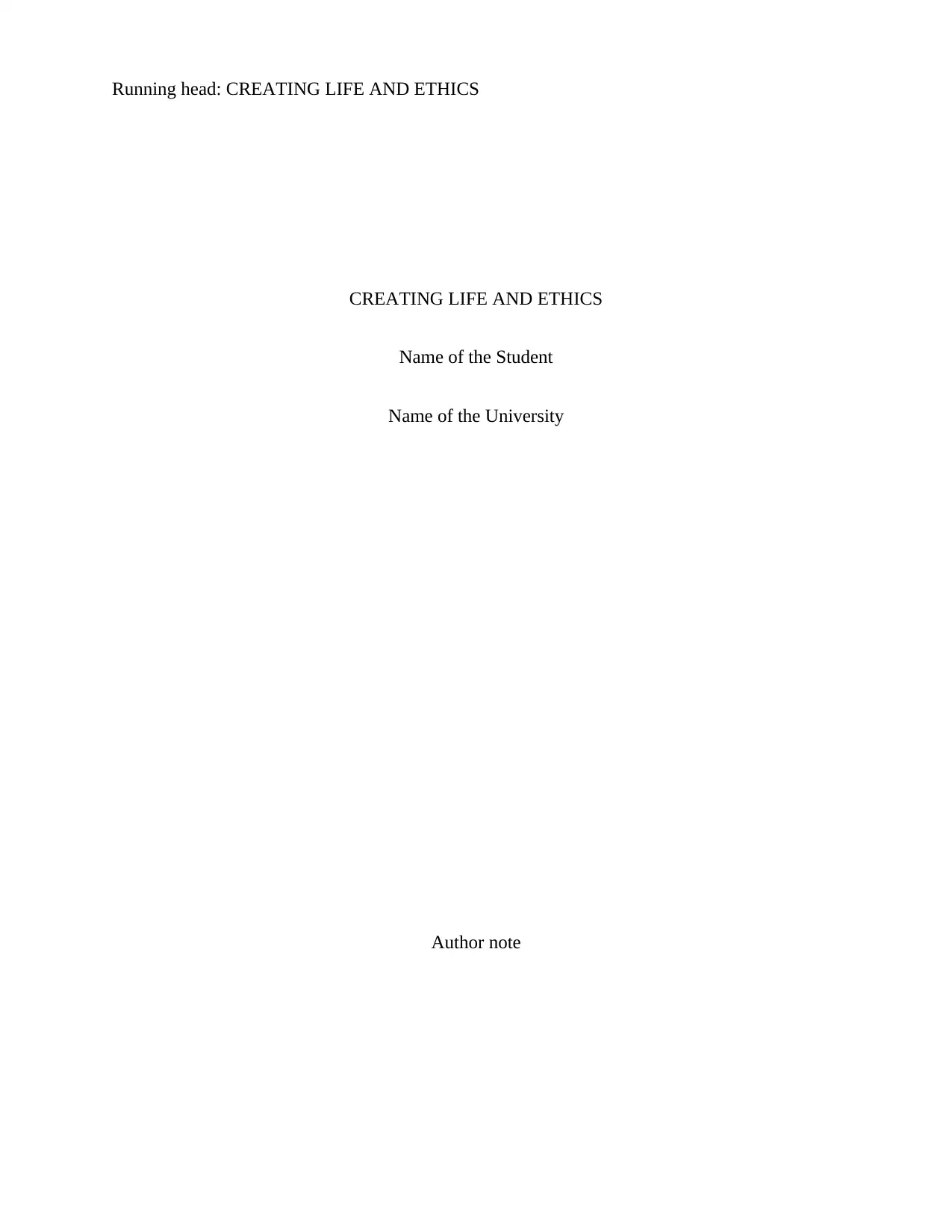
Running head: CREATING LIFE AND ETHICS
CREATING LIFE AND ETHICS
Name of the Student
Name of the University
Author note
CREATING LIFE AND ETHICS
Name of the Student
Name of the University
Author note
Paraphrase This Document
Need a fresh take? Get an instant paraphrase of this document with our AI Paraphraser
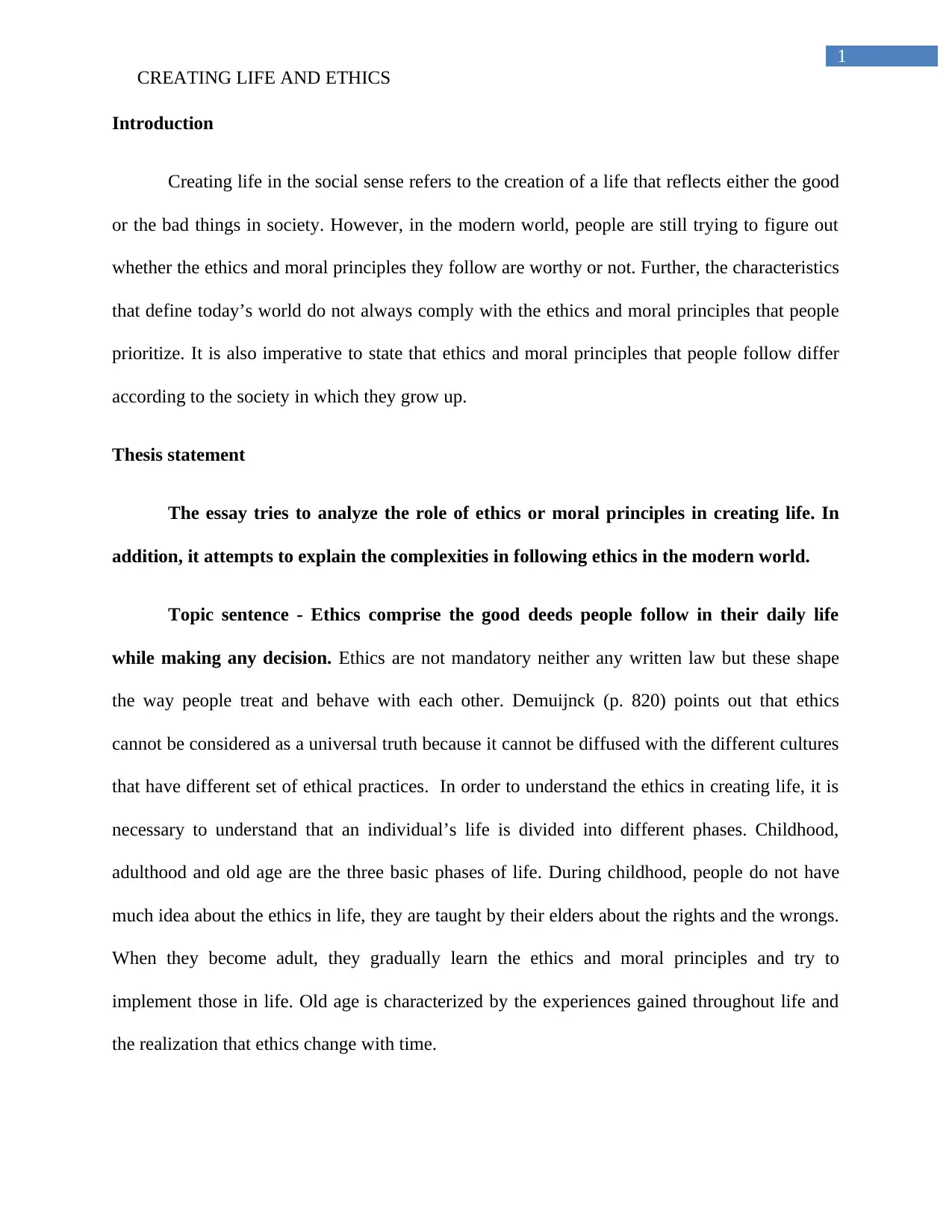
1
CREATING LIFE AND ETHICS
Introduction
Creating life in the social sense refers to the creation of a life that reflects either the good
or the bad things in society. However, in the modern world, people are still trying to figure out
whether the ethics and moral principles they follow are worthy or not. Further, the characteristics
that define today’s world do not always comply with the ethics and moral principles that people
prioritize. It is also imperative to state that ethics and moral principles that people follow differ
according to the society in which they grow up.
Thesis statement
The essay tries to analyze the role of ethics or moral principles in creating life. In
addition, it attempts to explain the complexities in following ethics in the modern world.
Topic sentence - Ethics comprise the good deeds people follow in their daily life
while making any decision. Ethics are not mandatory neither any written law but these shape
the way people treat and behave with each other. Demuijnck (p. 820) points out that ethics
cannot be considered as a universal truth because it cannot be diffused with the different cultures
that have different set of ethical practices. In order to understand the ethics in creating life, it is
necessary to understand that an individual’s life is divided into different phases. Childhood,
adulthood and old age are the three basic phases of life. During childhood, people do not have
much idea about the ethics in life, they are taught by their elders about the rights and the wrongs.
When they become adult, they gradually learn the ethics and moral principles and try to
implement those in life. Old age is characterized by the experiences gained throughout life and
the realization that ethics change with time.
CREATING LIFE AND ETHICS
Introduction
Creating life in the social sense refers to the creation of a life that reflects either the good
or the bad things in society. However, in the modern world, people are still trying to figure out
whether the ethics and moral principles they follow are worthy or not. Further, the characteristics
that define today’s world do not always comply with the ethics and moral principles that people
prioritize. It is also imperative to state that ethics and moral principles that people follow differ
according to the society in which they grow up.
Thesis statement
The essay tries to analyze the role of ethics or moral principles in creating life. In
addition, it attempts to explain the complexities in following ethics in the modern world.
Topic sentence - Ethics comprise the good deeds people follow in their daily life
while making any decision. Ethics are not mandatory neither any written law but these shape
the way people treat and behave with each other. Demuijnck (p. 820) points out that ethics
cannot be considered as a universal truth because it cannot be diffused with the different cultures
that have different set of ethical practices. In order to understand the ethics in creating life, it is
necessary to understand that an individual’s life is divided into different phases. Childhood,
adulthood and old age are the three basic phases of life. During childhood, people do not have
much idea about the ethics in life, they are taught by their elders about the rights and the wrongs.
When they become adult, they gradually learn the ethics and moral principles and try to
implement those in life. Old age is characterized by the experiences gained throughout life and
the realization that ethics change with time.
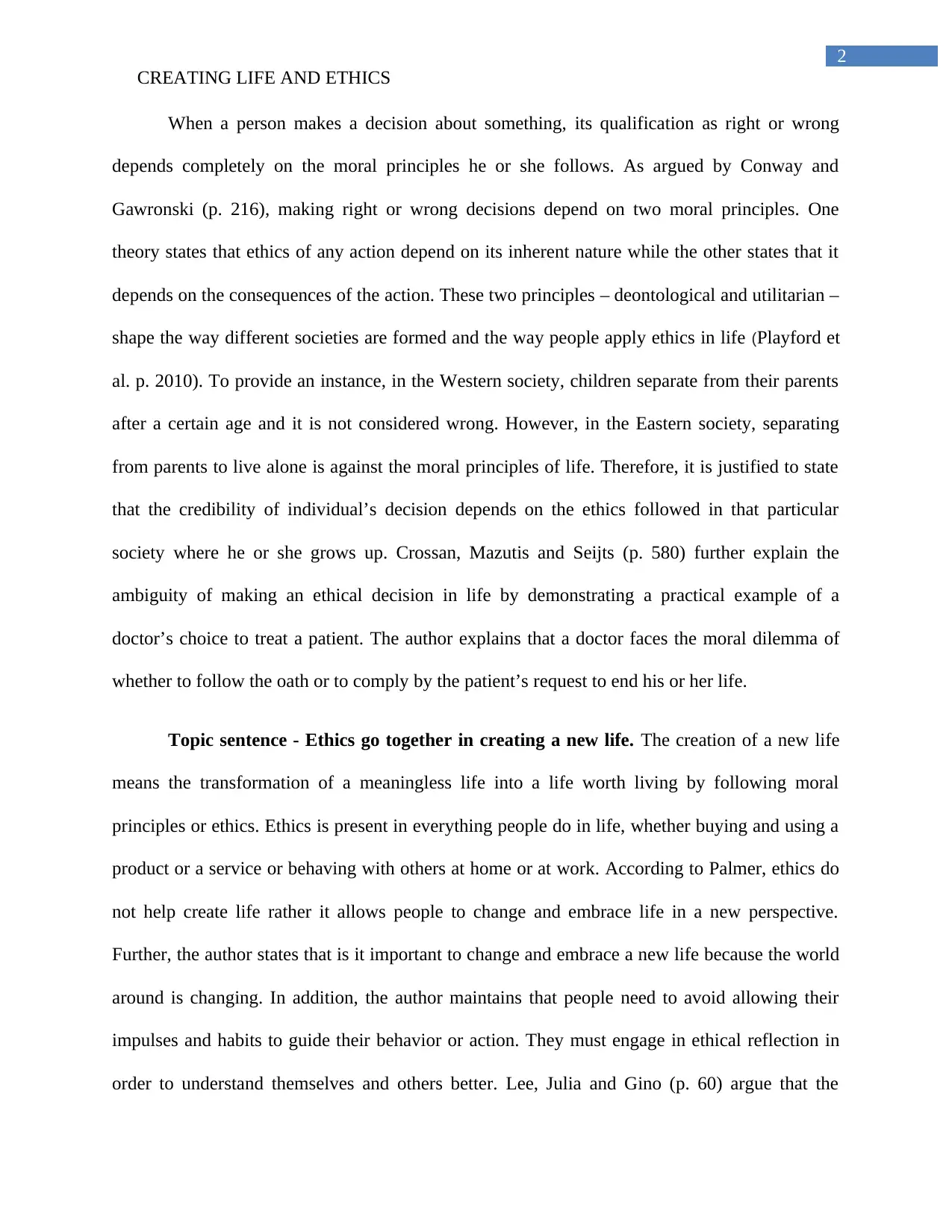
2
CREATING LIFE AND ETHICS
When a person makes a decision about something, its qualification as right or wrong
depends completely on the moral principles he or she follows. As argued by Conway and
Gawronski (p. 216), making right or wrong decisions depend on two moral principles. One
theory states that ethics of any action depend on its inherent nature while the other states that it
depends on the consequences of the action. These two principles – deontological and utilitarian –
shape the way different societies are formed and the way people apply ethics in life (Playford et
al. p. 2010). To provide an instance, in the Western society, children separate from their parents
after a certain age and it is not considered wrong. However, in the Eastern society, separating
from parents to live alone is against the moral principles of life. Therefore, it is justified to state
that the credibility of individual’s decision depends on the ethics followed in that particular
society where he or she grows up. Crossan, Mazutis and Seijts (p. 580) further explain the
ambiguity of making an ethical decision in life by demonstrating a practical example of a
doctor’s choice to treat a patient. The author explains that a doctor faces the moral dilemma of
whether to follow the oath or to comply by the patient’s request to end his or her life.
Topic sentence - Ethics go together in creating a new life. The creation of a new life
means the transformation of a meaningless life into a life worth living by following moral
principles or ethics. Ethics is present in everything people do in life, whether buying and using a
product or a service or behaving with others at home or at work. According to Palmer, ethics do
not help create life rather it allows people to change and embrace life in a new perspective.
Further, the author states that is it important to change and embrace a new life because the world
around is changing. In addition, the author maintains that people need to avoid allowing their
impulses and habits to guide their behavior or action. They must engage in ethical reflection in
order to understand themselves and others better. Lee, Julia and Gino (p. 60) argue that the
CREATING LIFE AND ETHICS
When a person makes a decision about something, its qualification as right or wrong
depends completely on the moral principles he or she follows. As argued by Conway and
Gawronski (p. 216), making right or wrong decisions depend on two moral principles. One
theory states that ethics of any action depend on its inherent nature while the other states that it
depends on the consequences of the action. These two principles – deontological and utilitarian –
shape the way different societies are formed and the way people apply ethics in life (Playford et
al. p. 2010). To provide an instance, in the Western society, children separate from their parents
after a certain age and it is not considered wrong. However, in the Eastern society, separating
from parents to live alone is against the moral principles of life. Therefore, it is justified to state
that the credibility of individual’s decision depends on the ethics followed in that particular
society where he or she grows up. Crossan, Mazutis and Seijts (p. 580) further explain the
ambiguity of making an ethical decision in life by demonstrating a practical example of a
doctor’s choice to treat a patient. The author explains that a doctor faces the moral dilemma of
whether to follow the oath or to comply by the patient’s request to end his or her life.
Topic sentence - Ethics go together in creating a new life. The creation of a new life
means the transformation of a meaningless life into a life worth living by following moral
principles or ethics. Ethics is present in everything people do in life, whether buying and using a
product or a service or behaving with others at home or at work. According to Palmer, ethics do
not help create life rather it allows people to change and embrace life in a new perspective.
Further, the author states that is it important to change and embrace a new life because the world
around is changing. In addition, the author maintains that people need to avoid allowing their
impulses and habits to guide their behavior or action. They must engage in ethical reflection in
order to understand themselves and others better. Lee, Julia and Gino (p. 60) argue that the
⊘ This is a preview!⊘
Do you want full access?
Subscribe today to unlock all pages.

Trusted by 1+ million students worldwide
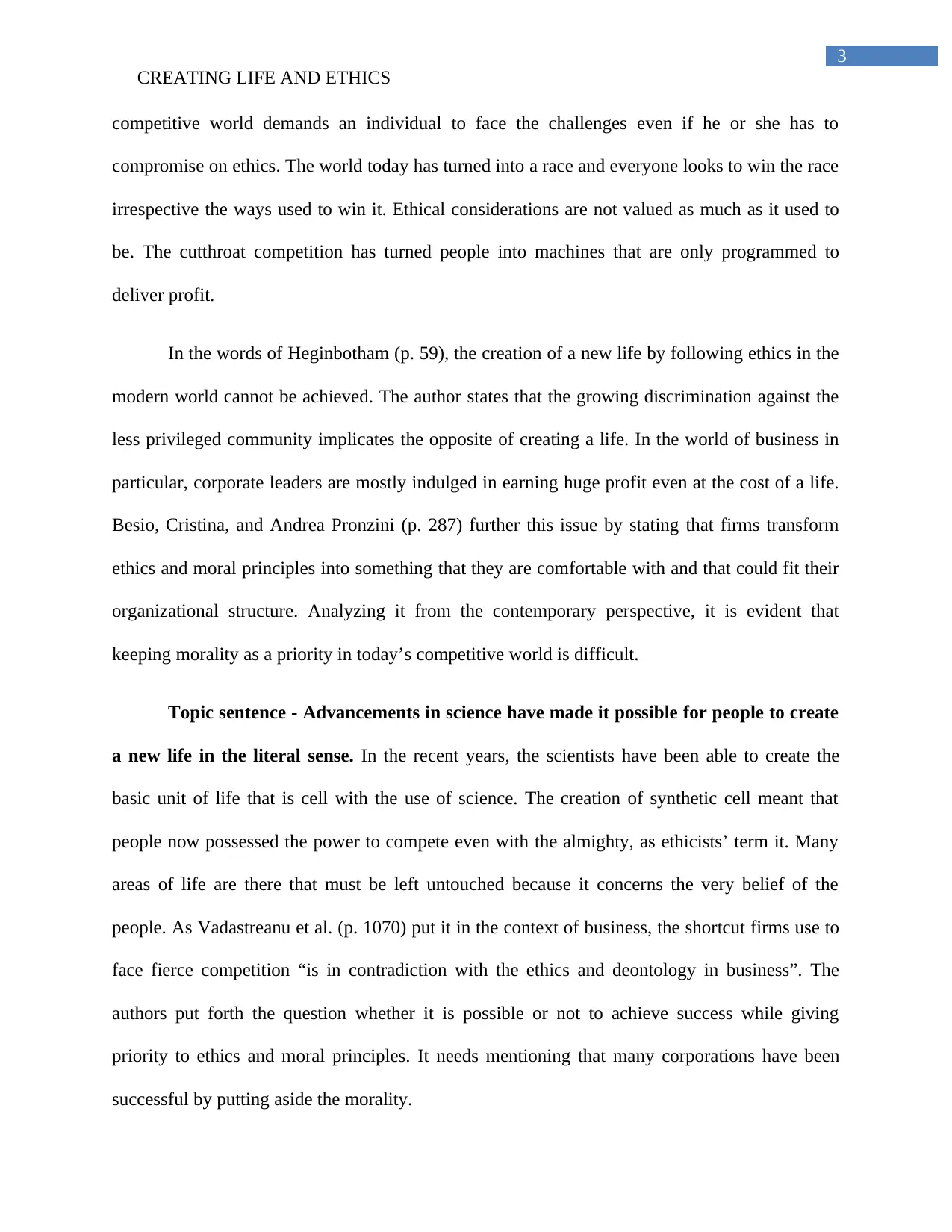
3
CREATING LIFE AND ETHICS
competitive world demands an individual to face the challenges even if he or she has to
compromise on ethics. The world today has turned into a race and everyone looks to win the race
irrespective the ways used to win it. Ethical considerations are not valued as much as it used to
be. The cutthroat competition has turned people into machines that are only programmed to
deliver profit.
In the words of Heginbotham (p. 59), the creation of a new life by following ethics in the
modern world cannot be achieved. The author states that the growing discrimination against the
less privileged community implicates the opposite of creating a life. In the world of business in
particular, corporate leaders are mostly indulged in earning huge profit even at the cost of a life.
Besio, Cristina, and Andrea Pronzini (p. 287) further this issue by stating that firms transform
ethics and moral principles into something that they are comfortable with and that could fit their
organizational structure. Analyzing it from the contemporary perspective, it is evident that
keeping morality as a priority in today’s competitive world is difficult.
Topic sentence - Advancements in science have made it possible for people to create
a new life in the literal sense. In the recent years, the scientists have been able to create the
basic unit of life that is cell with the use of science. The creation of synthetic cell meant that
people now possessed the power to compete even with the almighty, as ethicists’ term it. Many
areas of life are there that must be left untouched because it concerns the very belief of the
people. As Vadastreanu et al. (p. 1070) put it in the context of business, the shortcut firms use to
face fierce competition “is in contradiction with the ethics and deontology in business”. The
authors put forth the question whether it is possible or not to achieve success while giving
priority to ethics and moral principles. It needs mentioning that many corporations have been
successful by putting aside the morality.
CREATING LIFE AND ETHICS
competitive world demands an individual to face the challenges even if he or she has to
compromise on ethics. The world today has turned into a race and everyone looks to win the race
irrespective the ways used to win it. Ethical considerations are not valued as much as it used to
be. The cutthroat competition has turned people into machines that are only programmed to
deliver profit.
In the words of Heginbotham (p. 59), the creation of a new life by following ethics in the
modern world cannot be achieved. The author states that the growing discrimination against the
less privileged community implicates the opposite of creating a life. In the world of business in
particular, corporate leaders are mostly indulged in earning huge profit even at the cost of a life.
Besio, Cristina, and Andrea Pronzini (p. 287) further this issue by stating that firms transform
ethics and moral principles into something that they are comfortable with and that could fit their
organizational structure. Analyzing it from the contemporary perspective, it is evident that
keeping morality as a priority in today’s competitive world is difficult.
Topic sentence - Advancements in science have made it possible for people to create
a new life in the literal sense. In the recent years, the scientists have been able to create the
basic unit of life that is cell with the use of science. The creation of synthetic cell meant that
people now possessed the power to compete even with the almighty, as ethicists’ term it. Many
areas of life are there that must be left untouched because it concerns the very belief of the
people. As Vadastreanu et al. (p. 1070) put it in the context of business, the shortcut firms use to
face fierce competition “is in contradiction with the ethics and deontology in business”. The
authors put forth the question whether it is possible or not to achieve success while giving
priority to ethics and moral principles. It needs mentioning that many corporations have been
successful by putting aside the morality.
Paraphrase This Document
Need a fresh take? Get an instant paraphrase of this document with our AI Paraphraser
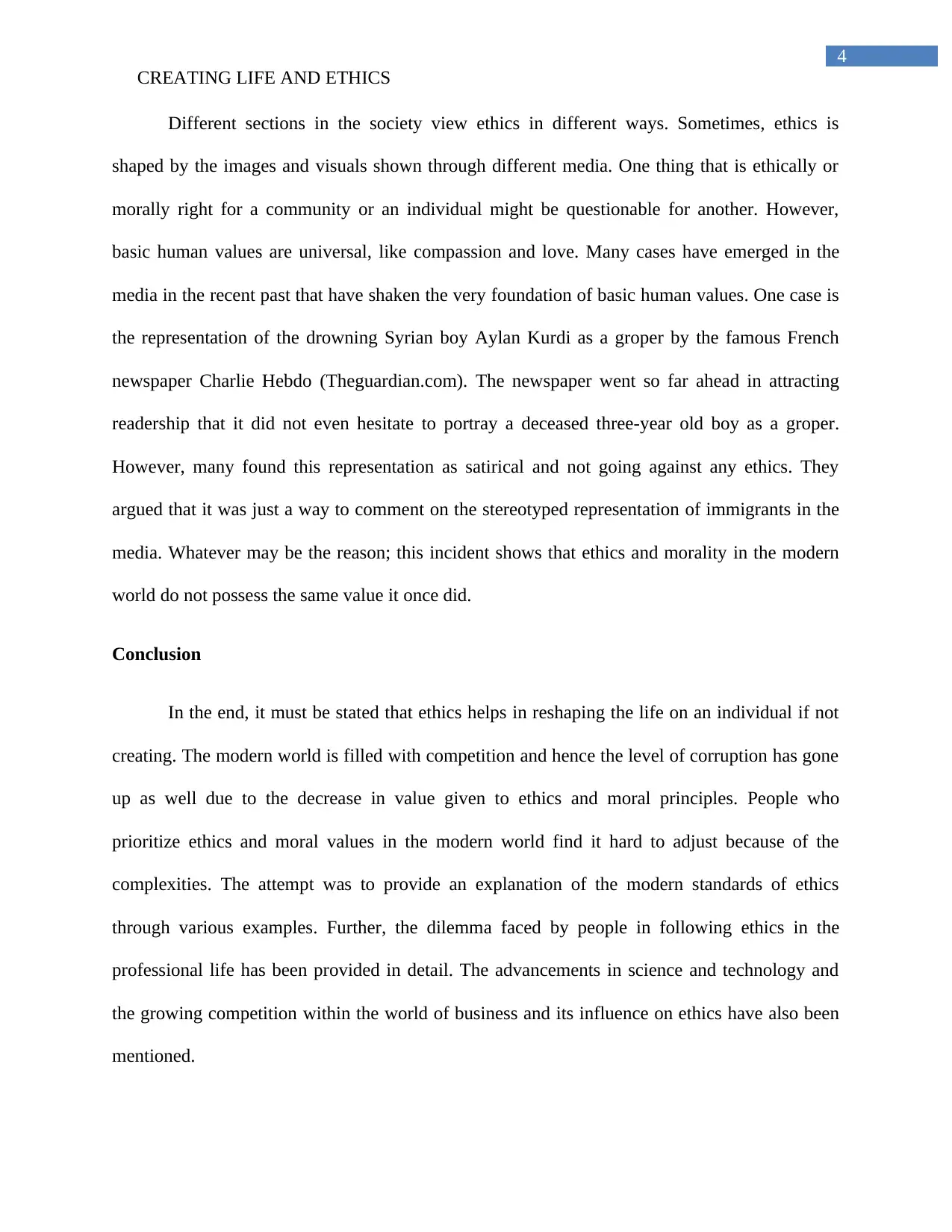
4
CREATING LIFE AND ETHICS
Different sections in the society view ethics in different ways. Sometimes, ethics is
shaped by the images and visuals shown through different media. One thing that is ethically or
morally right for a community or an individual might be questionable for another. However,
basic human values are universal, like compassion and love. Many cases have emerged in the
media in the recent past that have shaken the very foundation of basic human values. One case is
the representation of the drowning Syrian boy Aylan Kurdi as a groper by the famous French
newspaper Charlie Hebdo (Theguardian.com). The newspaper went so far ahead in attracting
readership that it did not even hesitate to portray a deceased three-year old boy as a groper.
However, many found this representation as satirical and not going against any ethics. They
argued that it was just a way to comment on the stereotyped representation of immigrants in the
media. Whatever may be the reason; this incident shows that ethics and morality in the modern
world do not possess the same value it once did.
Conclusion
In the end, it must be stated that ethics helps in reshaping the life on an individual if not
creating. The modern world is filled with competition and hence the level of corruption has gone
up as well due to the decrease in value given to ethics and moral principles. People who
prioritize ethics and moral values in the modern world find it hard to adjust because of the
complexities. The attempt was to provide an explanation of the modern standards of ethics
through various examples. Further, the dilemma faced by people in following ethics in the
professional life has been provided in detail. The advancements in science and technology and
the growing competition within the world of business and its influence on ethics have also been
mentioned.
CREATING LIFE AND ETHICS
Different sections in the society view ethics in different ways. Sometimes, ethics is
shaped by the images and visuals shown through different media. One thing that is ethically or
morally right for a community or an individual might be questionable for another. However,
basic human values are universal, like compassion and love. Many cases have emerged in the
media in the recent past that have shaken the very foundation of basic human values. One case is
the representation of the drowning Syrian boy Aylan Kurdi as a groper by the famous French
newspaper Charlie Hebdo (Theguardian.com). The newspaper went so far ahead in attracting
readership that it did not even hesitate to portray a deceased three-year old boy as a groper.
However, many found this representation as satirical and not going against any ethics. They
argued that it was just a way to comment on the stereotyped representation of immigrants in the
media. Whatever may be the reason; this incident shows that ethics and morality in the modern
world do not possess the same value it once did.
Conclusion
In the end, it must be stated that ethics helps in reshaping the life on an individual if not
creating. The modern world is filled with competition and hence the level of corruption has gone
up as well due to the decrease in value given to ethics and moral principles. People who
prioritize ethics and moral values in the modern world find it hard to adjust because of the
complexities. The attempt was to provide an explanation of the modern standards of ethics
through various examples. Further, the dilemma faced by people in following ethics in the
professional life has been provided in detail. The advancements in science and technology and
the growing competition within the world of business and its influence on ethics have also been
mentioned.
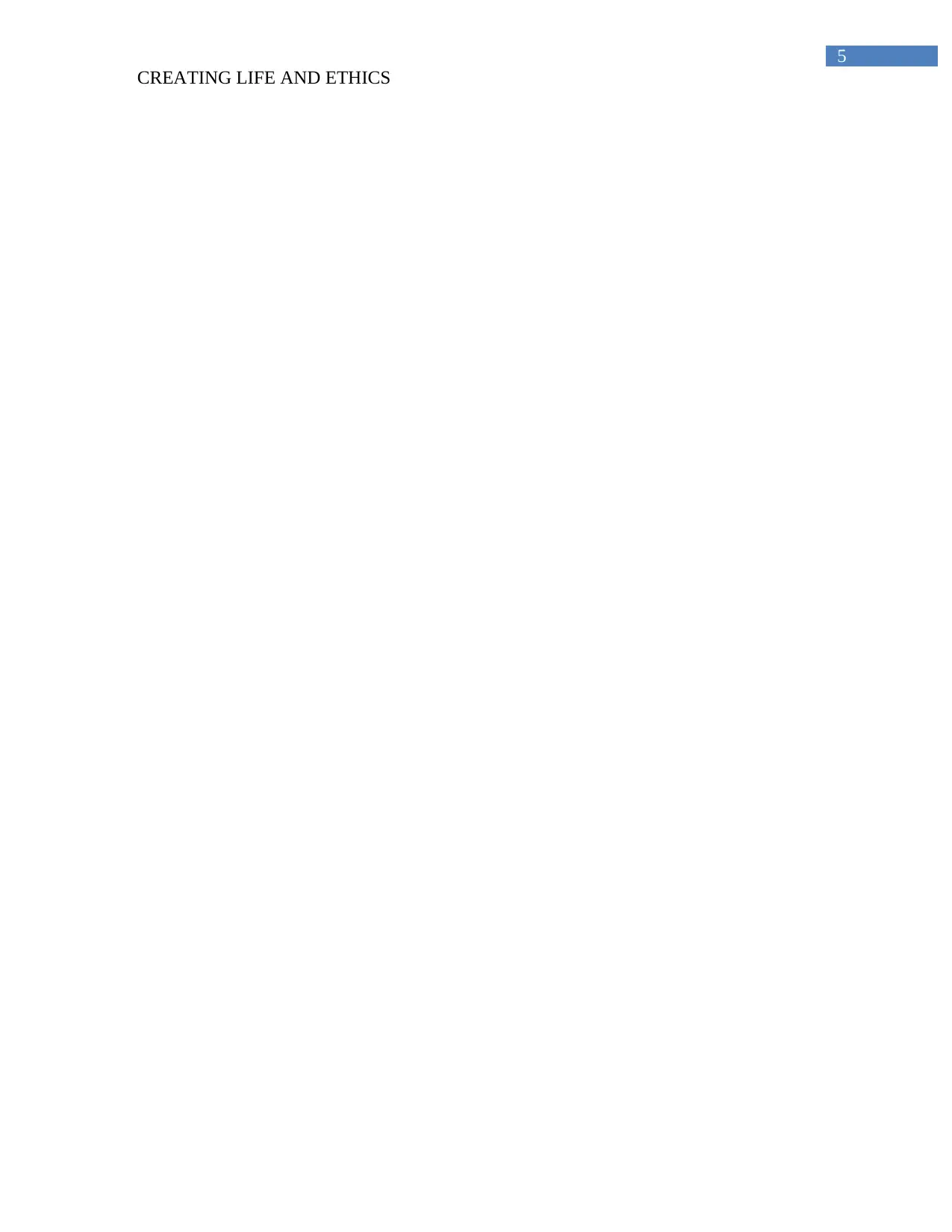
5
CREATING LIFE AND ETHICS
CREATING LIFE AND ETHICS
⊘ This is a preview!⊘
Do you want full access?
Subscribe today to unlock all pages.

Trusted by 1+ million students worldwide
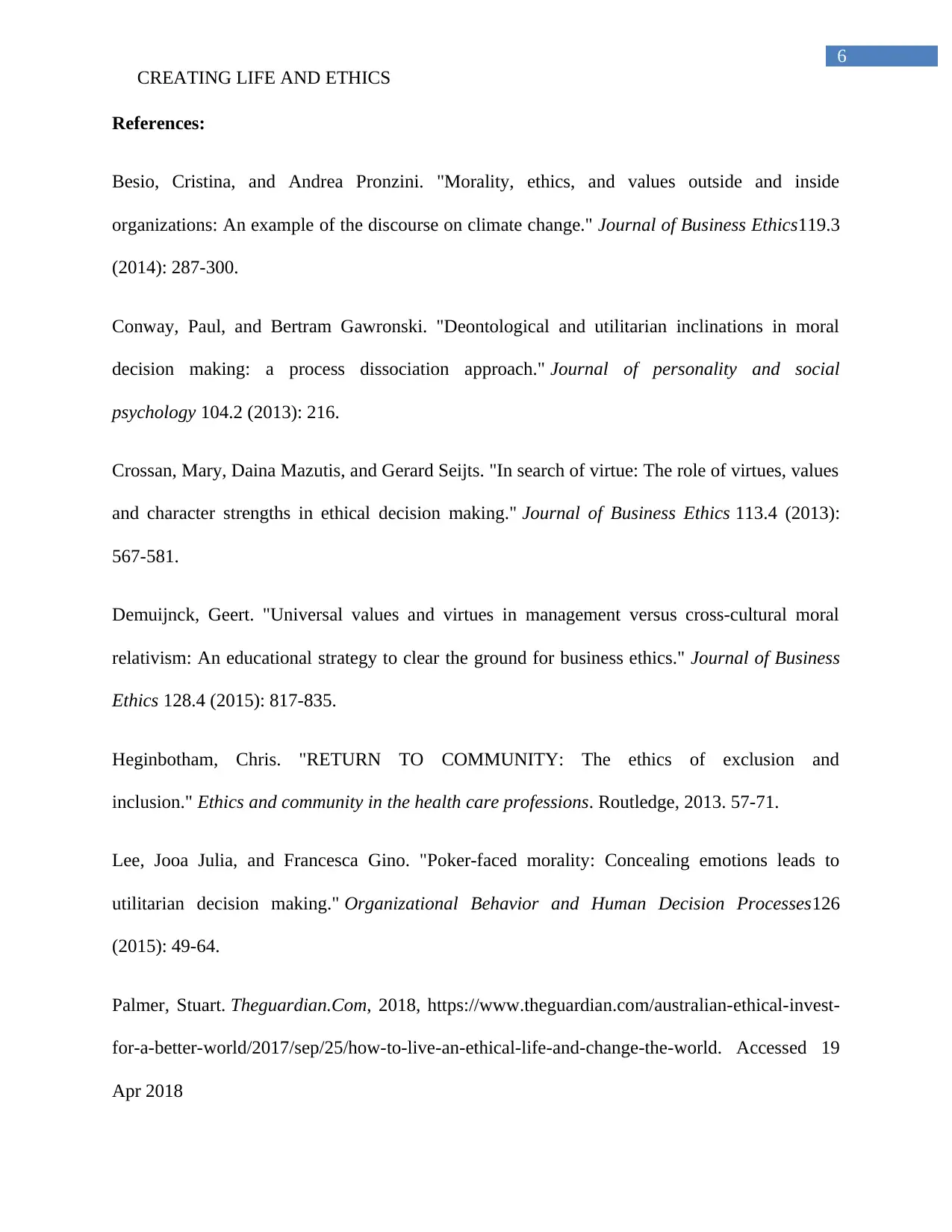
6
CREATING LIFE AND ETHICS
References:
Besio, Cristina, and Andrea Pronzini. "Morality, ethics, and values outside and inside
organizations: An example of the discourse on climate change." Journal of Business Ethics119.3
(2014): 287-300.
Conway, Paul, and Bertram Gawronski. "Deontological and utilitarian inclinations in moral
decision making: a process dissociation approach." Journal of personality and social
psychology 104.2 (2013): 216.
Crossan, Mary, Daina Mazutis, and Gerard Seijts. "In search of virtue: The role of virtues, values
and character strengths in ethical decision making." Journal of Business Ethics 113.4 (2013):
567-581.
Demuijnck, Geert. "Universal values and virtues in management versus cross-cultural moral
relativism: An educational strategy to clear the ground for business ethics." Journal of Business
Ethics 128.4 (2015): 817-835.
Heginbotham, Chris. "RETURN TO COMMUNITY: The ethics of exclusion and
inclusion." Ethics and community in the health care professions. Routledge, 2013. 57-71.
Lee, Jooa Julia, and Francesca Gino. "Poker-faced morality: Concealing emotions leads to
utilitarian decision making." Organizational Behavior and Human Decision Processes126
(2015): 49-64.
Palmer, Stuart. Theguardian.Com, 2018, https://www.theguardian.com/australian-ethical-invest-
for-a-better-world/2017/sep/25/how-to-live-an-ethical-life-and-change-the-world. Accessed 19
Apr 2018
CREATING LIFE AND ETHICS
References:
Besio, Cristina, and Andrea Pronzini. "Morality, ethics, and values outside and inside
organizations: An example of the discourse on climate change." Journal of Business Ethics119.3
(2014): 287-300.
Conway, Paul, and Bertram Gawronski. "Deontological and utilitarian inclinations in moral
decision making: a process dissociation approach." Journal of personality and social
psychology 104.2 (2013): 216.
Crossan, Mary, Daina Mazutis, and Gerard Seijts. "In search of virtue: The role of virtues, values
and character strengths in ethical decision making." Journal of Business Ethics 113.4 (2013):
567-581.
Demuijnck, Geert. "Universal values and virtues in management versus cross-cultural moral
relativism: An educational strategy to clear the ground for business ethics." Journal of Business
Ethics 128.4 (2015): 817-835.
Heginbotham, Chris. "RETURN TO COMMUNITY: The ethics of exclusion and
inclusion." Ethics and community in the health care professions. Routledge, 2013. 57-71.
Lee, Jooa Julia, and Francesca Gino. "Poker-faced morality: Concealing emotions leads to
utilitarian decision making." Organizational Behavior and Human Decision Processes126
(2015): 49-64.
Palmer, Stuart. Theguardian.Com, 2018, https://www.theguardian.com/australian-ethical-invest-
for-a-better-world/2017/sep/25/how-to-live-an-ethical-life-and-change-the-world. Accessed 19
Apr 2018
Paraphrase This Document
Need a fresh take? Get an instant paraphrase of this document with our AI Paraphraser
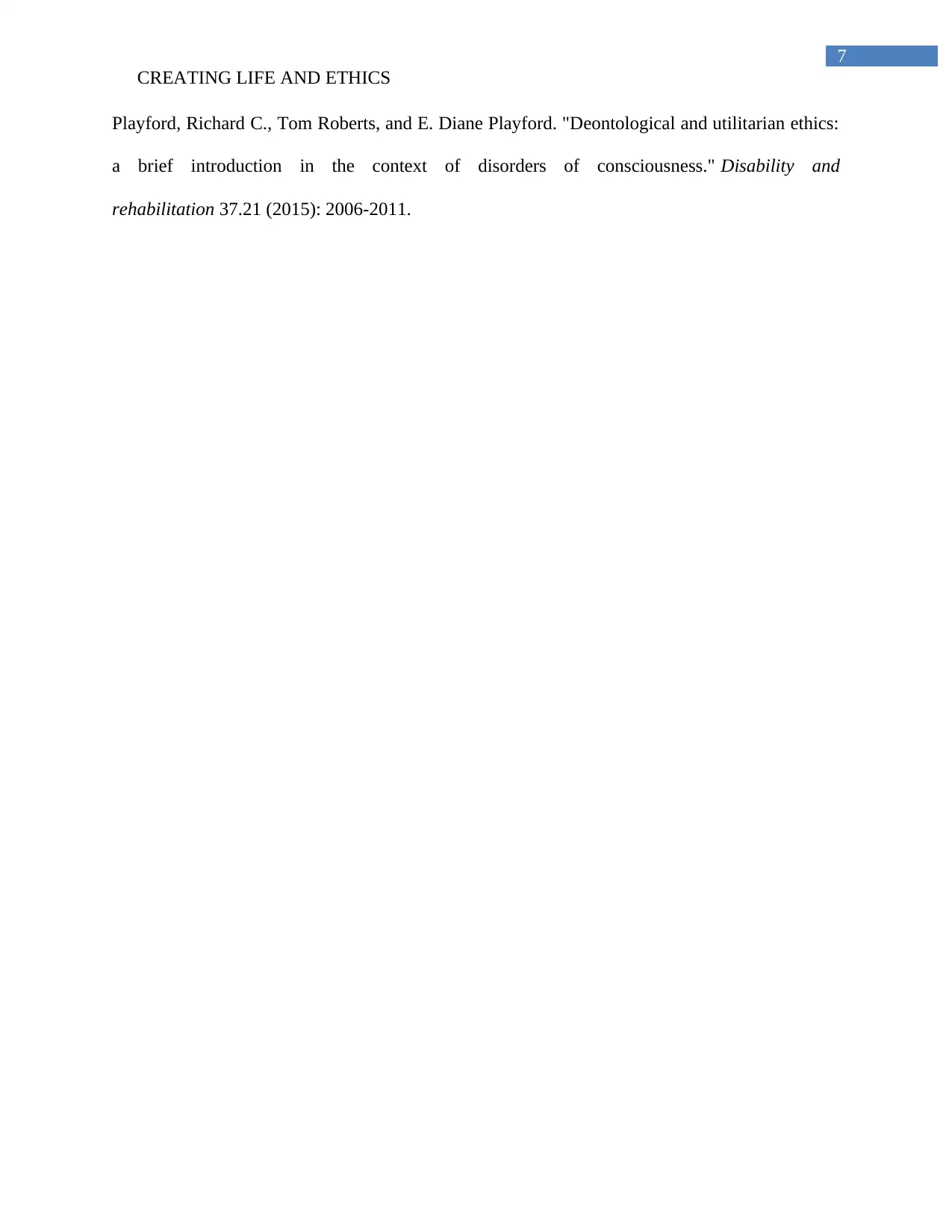
7
CREATING LIFE AND ETHICS
Playford, Richard C., Tom Roberts, and E. Diane Playford. "Deontological and utilitarian ethics:
a brief introduction in the context of disorders of consciousness." Disability and
rehabilitation 37.21 (2015): 2006-2011.
CREATING LIFE AND ETHICS
Playford, Richard C., Tom Roberts, and E. Diane Playford. "Deontological and utilitarian ethics:
a brief introduction in the context of disorders of consciousness." Disability and
rehabilitation 37.21 (2015): 2006-2011.
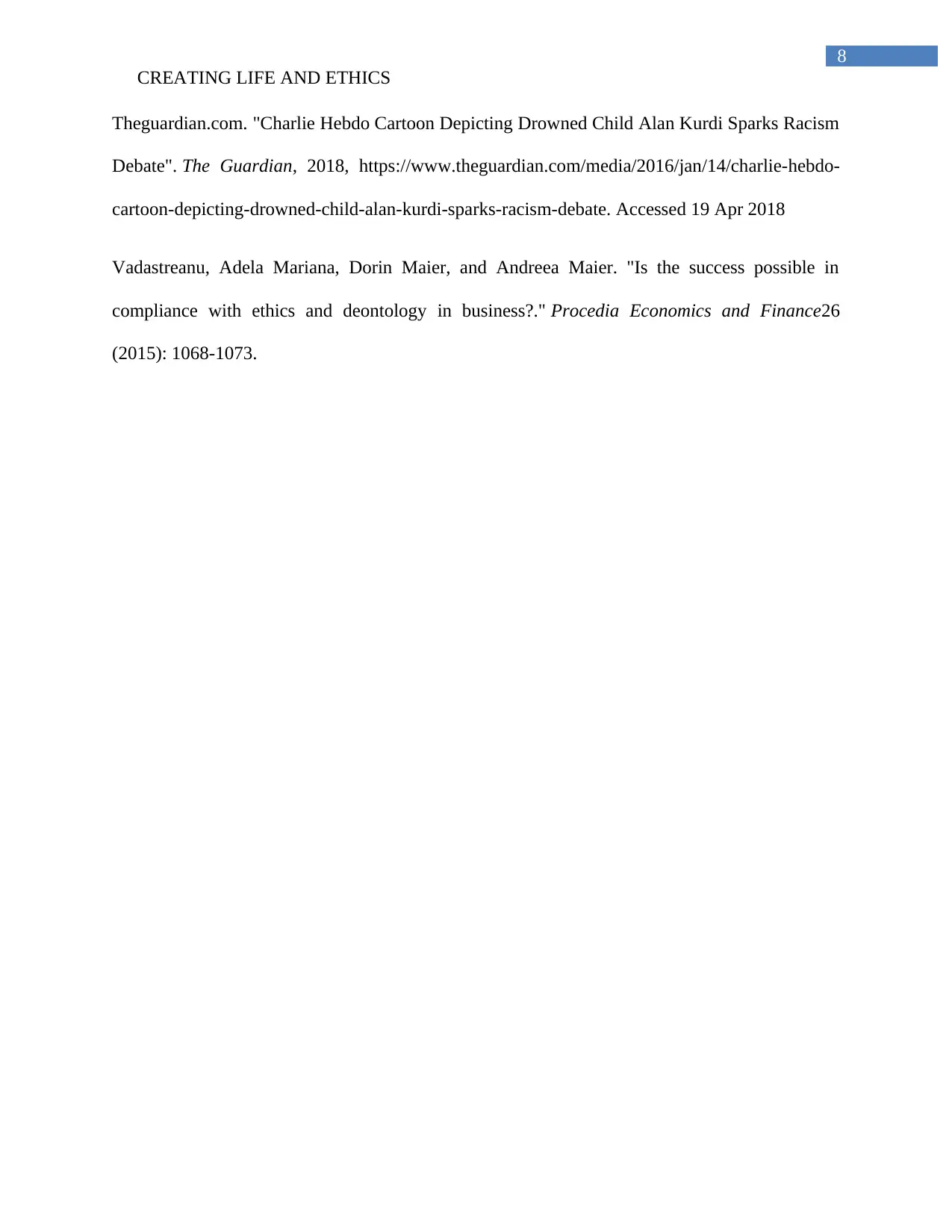
8
CREATING LIFE AND ETHICS
Theguardian.com. "Charlie Hebdo Cartoon Depicting Drowned Child Alan Kurdi Sparks Racism
Debate". The Guardian, 2018, https://www.theguardian.com/media/2016/jan/14/charlie-hebdo-
cartoon-depicting-drowned-child-alan-kurdi-sparks-racism-debate. Accessed 19 Apr 2018
Vadastreanu, Adela Mariana, Dorin Maier, and Andreea Maier. "Is the success possible in
compliance with ethics and deontology in business?." Procedia Economics and Finance26
(2015): 1068-1073.
CREATING LIFE AND ETHICS
Theguardian.com. "Charlie Hebdo Cartoon Depicting Drowned Child Alan Kurdi Sparks Racism
Debate". The Guardian, 2018, https://www.theguardian.com/media/2016/jan/14/charlie-hebdo-
cartoon-depicting-drowned-child-alan-kurdi-sparks-racism-debate. Accessed 19 Apr 2018
Vadastreanu, Adela Mariana, Dorin Maier, and Andreea Maier. "Is the success possible in
compliance with ethics and deontology in business?." Procedia Economics and Finance26
(2015): 1068-1073.
⊘ This is a preview!⊘
Do you want full access?
Subscribe today to unlock all pages.

Trusted by 1+ million students worldwide
1 out of 9
Related Documents
Your All-in-One AI-Powered Toolkit for Academic Success.
+13062052269
info@desklib.com
Available 24*7 on WhatsApp / Email
![[object Object]](/_next/static/media/star-bottom.7253800d.svg)
Unlock your academic potential
Copyright © 2020–2026 A2Z Services. All Rights Reserved. Developed and managed by ZUCOL.





